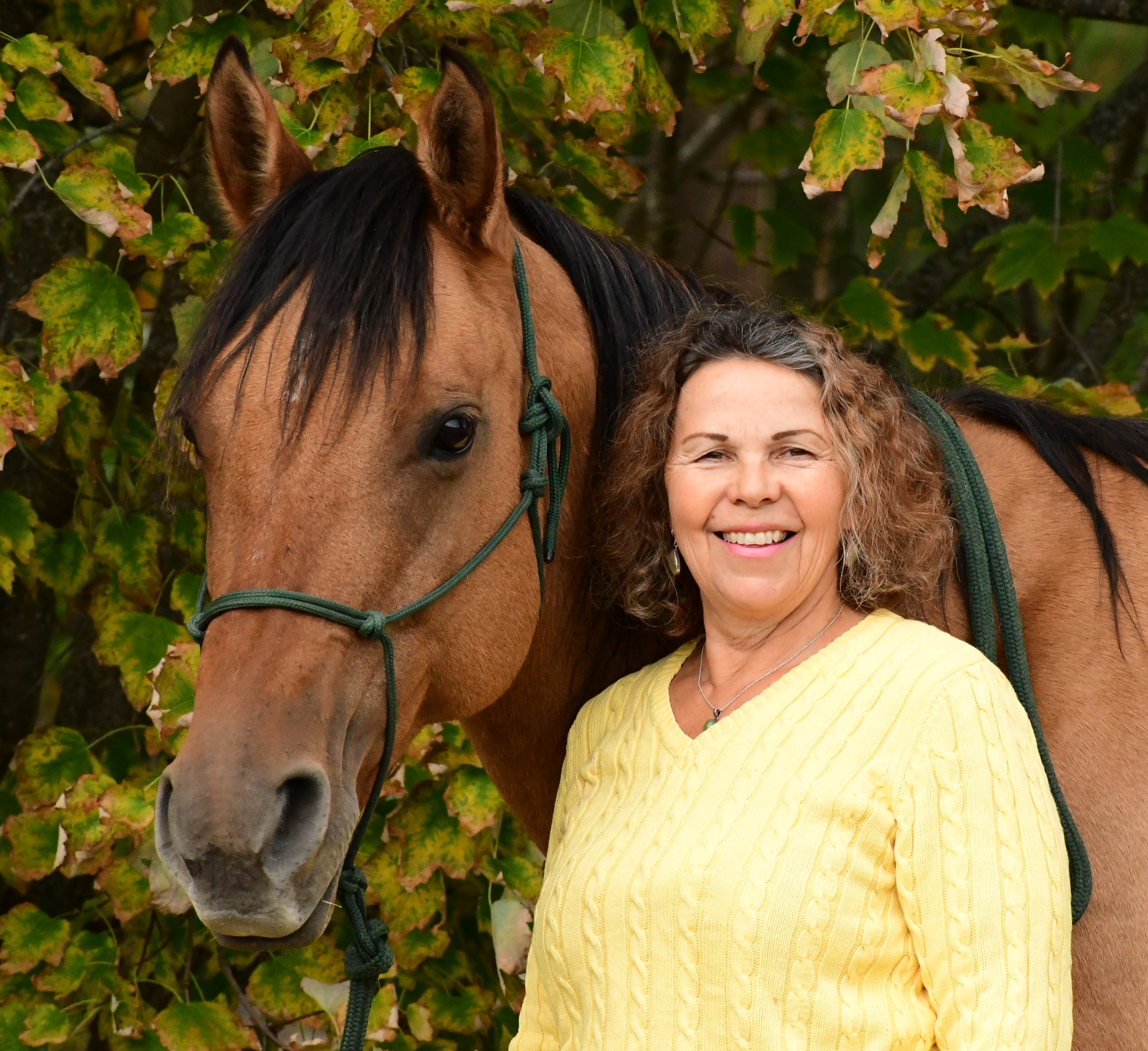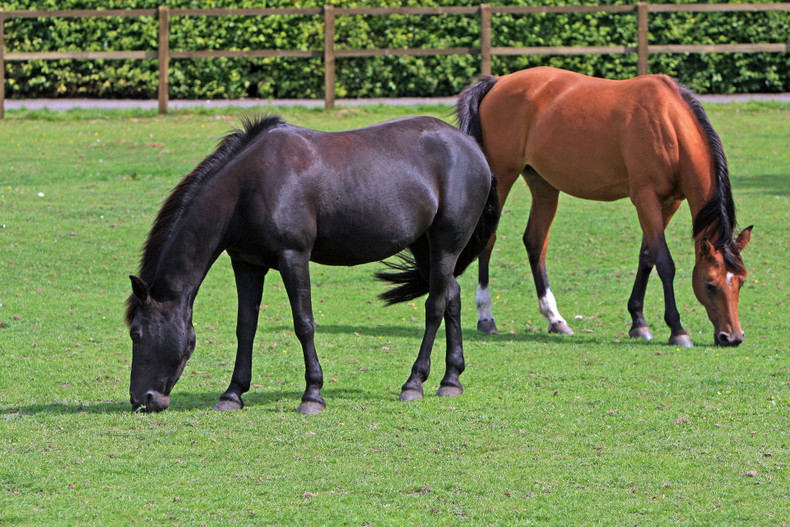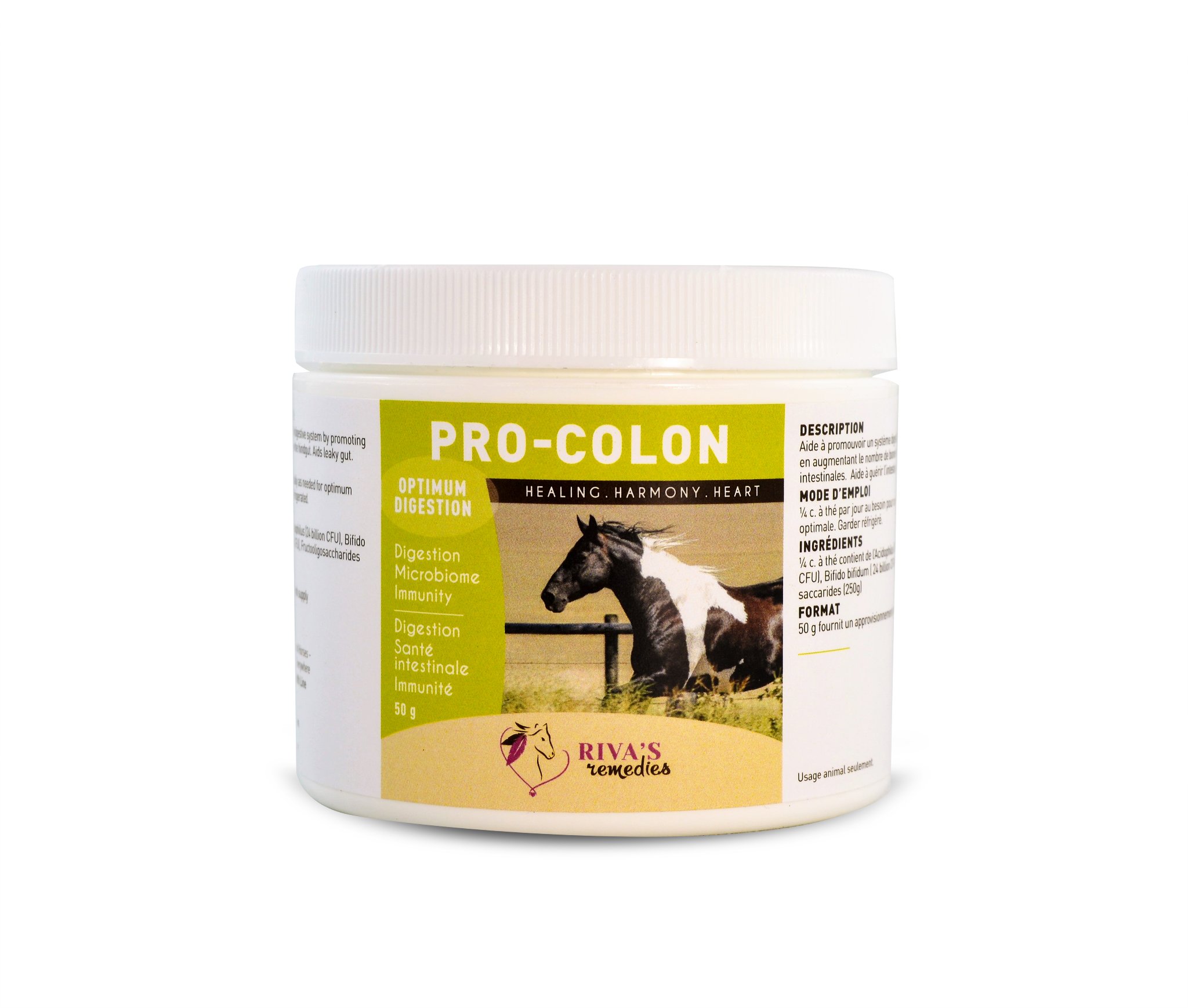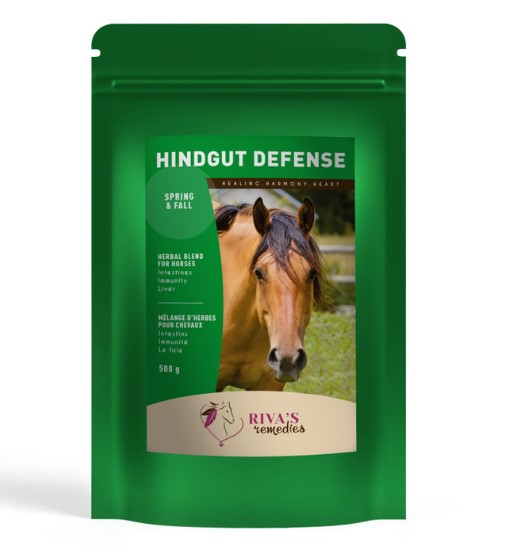Why Do Horses Get Parasites?
Of all domestic livestock, horses have the largest numbers of parasites including large strongyles, small strongyles, roundworms, and pinworms. Roundworms only affect weanlings and yearlings, with encysted larvae migrating to the liver, heart, or lungs. Infected youngsters will generally show symptoms of malnutrition, colic, failure to thrive, unhealthy hair coat, pot belly, and possible coughing. Pinworms lay eggs around the anus of the horse, causing tail itching and hair loss. However, I find that most cases of tail itching in the summer time is actually due to the sugars in the grass.
Horses that graze on grass in a domesticated living environment are the most susceptible, since parasites spend a part of their life cycle living on the grass blades. In fact, studies have determined that grazing horses are far more likely to host parasites than those horses housed on dry lots with hay diets. Horses graze close to the ground and, more than other livestock, are always smelling, nibbling, and licking, whereby they can pick up large numbers of infective larvae.
Grazing horses are also at risk if they are allowed to overgraze their pasture, because overgrazed, nutrient-poor grass favours higher larval populations. Insufficient space for multiple horses is also a risk factor because in tight quarters they are more likely to pick up eggs shed by one another.
The Path of the Parasite
Once in the horse’s digestive tract, female parasites lay eggs in the hindgut. In the spring, these eggs are passed to the ground inside the feces. Under proper environmental conditions, including warmth and moisture, the eggs hatch into larvae in the manure. But under cold and dry conditions, the eggs can survive un-hatched for long periods, waiting to emerge when the conditions are right. The infective larvae migrate onto grass blades, where they remain until grazing horses swallow them. They then develop into young parasites in the intestines.
Encysted Strongyles
Usually in the fall, prompted by the changes in daylight, ingested intestinal larvae penetrate the wall of the large intestine and begin another life cycle within the host. These hibernating larvae are called encysts.
Large strongyles, known as bloodworms, can enter the bloodstream as encysts and migrate for six to seven months along the walls of the arteries including the mesenteric artery, the liver, the kidneys, the pancreas, and the intestinal wall causing tissue damage and symptoms of organ dysfunction. They eventually return to the large intestine as young adults. Large strongyles can be responsible for weight loss, a dull coat, poor appetite, a pot belly, itching, fatigue, bloating, colic, diarrhea, and hoof toxicity.
But the most common parasites to infect equines are small strongyles. They are particularly problematic because they burrow into the intestinal lining of the large intestine where they can stay for years. In defense the horse’s body creates inflammation and forms scar tissue around each larvae. The process forms little blood-filled cysts which the larvae can feed off. Small strongyles can therefore cause colic, anemia, weight loss, and mal-absorption of nutrients.
Bear in mind that it is not of benefit for any type of parasite to kill off its host so most horses continue to get sicker rather than die.
Treatment
The treatment of equine parasites is not as simple as we think. Nor is it as easy as shooting a full syringe of any dewormer into your horse’s mouth twice per year. Not only are there different types of parasites but each horse has different levels of resistance – some horses with a high count have no symptoms whatsoever and other horses with hardly any infestation have no resistance at all and show a variety of symptoms. As well, there is much concern about over-medicating horses with chemical dewormers leading to imbalances in the colon as well as the mutation and resistance of the parasites themselves. And unfortunately, for some horses, especially those with encysts or heavy loads, herbal and homeopathic treatments are not effective enough.
Chemical Dewormers – The Risks
Chemical dewormers came on the scene in the 1960s to target all species of worms. Only one new deworming medicine has been introduced in the past 15-20 years and few new ones are expected. In recent years, however, the chemical war on parasites has become less popular for the following reasons:
- Worms, especially small strongyles and roundworms, adaptive creatures that they are, have learned to build resistance. This has no doubt been spurred on by overly-aggressive parasite drug treatments putting selective pressure on worms to mutate. The indiscriminate and repetitive use of chemical dewormers on horses (especially those horses who may not even be infested), leads to parasitic mutation, and puts the horses at risk for toxic chemical overload and compromised immunity.
- Using chemical dewormers too often (e.g. daily or weekly) or using excessive dosages can contribute to intestinal damage, a change in the colonic ecosystem, a depletion of probiotics, liver and kidney stress, and overall chemical toxicity. Adverse reactions to all chemical dewormers may include drooling, colic, swellings, weight loss, allergic reactions, blindness, vision problems, and laminitis. Don’t keep repeating or increasing dosages or trying different medications when they are not working. Random treatments used in a parasite laden environment without improving the nutrition will accomplish very little. It is not a relentless war of eradication.
- Be cautious of dewormers that kill encysted larvae, since in order to do so the drug must chemically alter the intestinal membrane to access the larvae. In sensitive horses this can lead to leaky gut, malnutrition, colic, and weight loss – sometimes extreme.
- Chemical dewormers often trigger the unaffected encysted larvae to emerge and develop into adult worms as soon as the drug is gone from the horse’s system. These newly developed adult parasites begin to shed eggs and, depending on the time of year, can begin developing into parasites almost immediately. Consider using 2-3 smaller dosages once per week for 2-3 weeks afterward.
- Small strongyles that are encysted in the intestinal walls only respond to two different chemicals: moxidectin and fenbendazole. If you use other less effective dewormers on a horse with an extreme overload of small strongyle encysts a dangerous process called emergence (Larval Cyathostomosis) can happen. Encysts in the intestinal wall will emerge into the colon all at once in an attempt to replace the non-encysted ones that have been killed by the dewormer. This onslaught can cause colic, weight loss, diarrhea, and swelling.
- Only 30% of the horses in any herd (usually those with the lowest resistance) are carrying the majority of the parasite load. This means that nearly 70% of our horses are subjected to excessive and unnecessary chemicals on a regular basis.
- Chemical parasite control measures shift our focus away from more natural parasite preventions such as controlling environmental contamination and keeping our horses intestinal health resistant to infections of all kinds, including parasites.
Chemical Dewormers – When to Use
- Chemical dewormers are very much still a necessity for horses with a heavy parasite load, those who have not been treated on a regular basis, those horses who are primarily out on grass, and those horses who have encysts, of which there are many. Horses on hay-only diets are far less prone to parasite loads than horses on grass.
- Always make use of fecal parasite tests before deworming to determine whether or not your horse even has an overload of parasites. Bear in mind that a fecal parasite count will not indicate the presence of encysted parasites in those horses with high levels of encysted parasites although those horses will often (but not always) be high shedders as well.
- When using any kind of chemical dewormers be sure to protect the colon and liver from chemical trauma and toxicity by combining with the following natural program:
 | Pro-Colon pre and probiotic (live bacteria) One 30-day course once or twice per year to re-establish healthy levels of friendly bacteria. |
 | Gastricol (homeopathic remedy) Give one dose – twice daily 3 days before the de-worming and 7-10 days after the last chemical dose. |
 | Vitamin C (ascorbic acid) 2 tsp daily (one tsp = 5,000 mg) for 14-21 days. |
Chemical Dewormers vs Herbal Dewormers
I have seen the fecal tests of many, many horses who were either not dewormed at all or were given a variety of different dewormers including chemicals, diatomaceous earth, and various herbs. I wish it were not so but most of those horses who had not been given chemical dewormers at any time, or were given only herbal remedies had the highest loads. And those same horses with moderate to high counts or encysts were not able to reduce their fecal count with natural remedies alone.
That said, we can still reduce the amount, frequency, and potential damage of chemical de-wormers by ensuring good nutrition and using effective natural remedies. Parasite resistance and prevention is very dependent on optimum digestion, a healthy hindgut, and a strong intestinal immune system.
Natural Parasite Prevention
Poor resistance to parasites is caused by poor feeding practices, inadequate nutrition, lack of exercise, stress, and a toxic colon. Horses in poor condition with digestive problems are good hosts. The intestinal environment created by high sugar-carbohydrate diets from excess grass or grain is favoured by disease causing-pathogens and parasites. High sugar fermentation produces a highly acidic environment that favours and encourages the proliferation of bacteria, yeast, and parasites.
Horses are not meant to have a sterile intestinal system. A healthy ecosystem relies on a balance of microorganisms including bacteria, yeast, and some parasites. If horses are never exposed to parasites, they will never build natural immunity and stronger resistance.
Parasite Prevention Practices
- Feed a low sugar diet.
- Keep grass grazing, grains, and commercial feeds to a minimum.
- Feed your horses frequently. Small frequent meals or slow feeders encourage strong digestion and prevent stress, ulcers, and poor resistance to parasites. Don’t let your horses stand idle for long periods of time without anything to eat.
- Ensure regular exercise – exercise is critical for a healthy digestive tract.
- If possible, allow your horses free forage so that they choose different plant medicines that they are drawn toward.
- Build resistance with natural and herbal remedies.
Riva’s Remedies:
Feed the following program for 4-6 weeks – twice per year.
| Pro-Colon - pro and pre biotics (50g, 100g, 250g) This is a blend of live bacteria formulated specifically for horses to promote a healthy intestinal immune system, protect the eco-system, and support nutrient absorption. |
| Hindgut Defense - herbal blend – Supports a healthy hindgut for horses with parasites, bacteria, and yeast. It maintains the intestinal immune system and promotes liver detoxification. |
Healthy Horses
By understanding parasites, as well as the various ways to build resistance, the prevention and treatment programs for horses with parasite loads – low or high – can be a lot more effective than what many of us have in place right now.
The naturally healthy horse with a high level of resistance is a horse with strong immunity, efficient digestion, suitable diets, adequate levels of exercise or free forage, regular cleanses, and well-selected remedies, including the smart use of chemical dewormers.
Click here to book a parasite consultation.

Marijke van de Water, B.Sc., DHMS
Equine Health & Nutrition Specialist
Homeopathic Practitioner
Medical Intuitive & Healer
Educator & Author
Marijke is a life-long horse lover, the author of the best-selling Healing Horses Their Way, and the founder, formulator, and CEO of Riva’s Remedies. She is a gifted healer who helps horses, and their people, from around the world live happier, healthier lives



